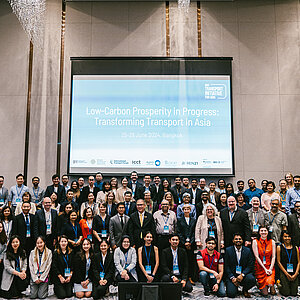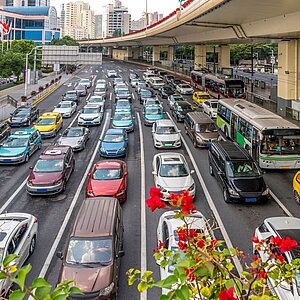Accelerating Climate Action in Transport: Lessons from China, India, and Vietnam

The NDC Transport Initiative, which is supported by the IKI, summarises experiences from Asia on reducing greenhouse gas emissions in the transport sector.
Countries must devote special attention to climate protection in the transport sector if the Paris agreement targets are to remain within reach. This is particularly true for G20 countries, as highlighted in a recent report by Agora Verkehrswende, GIZ and the National Institution for Transforming India (NITI Aayog) on the current status of international efforts to transform the transport sector.
Published at a G20 working meeting in Goa, ‘Towards Decarbonising Transport 2023’ provides updated evidence that greenhouse gas emissions from transport are set to increase significantly worldwide by 2050, rather than falling to zero, despite technological advances and planned policy measures.
Since 1990, transport emissions have risen by 80%, faster than any other sector. Asia is currently responsible for almost 40% of global transport emissions. Comprehensive solutions to decarbonisation are needed that go beyond fuel standards and electrification, address shift measures and include renewable energy integration and ending fossil fuel subsidies.
The NDC Transport Initiative for Asia has drawn five lessons from its work in China, India and Vietnam on how countries can increase their transport ambition and accelerate climate action.
1. Clear Targets and Long-term Vision
China, India, and Vietnam are faced with rising transport emissions due to urbanisation and economic growth. To counteract this trend, it is essential that transport-related targets are incorporated within climate pledges. China's "1+N" policy framework with sectoral plans, India Rail's goal to achieve net-zero status for railroads by 2030, and Vietnam's comprehensive action plan for transport to contribute to Vietnam’s net zero emission target by 2050 highlight diverse approaches toward carbon neutrality. This underscores the importance of defining sectoral targets and tailored strategies based on each country's unique circumstances. India is yet to formulate a national transport sector mitigation target.
2. Financing the Transformation
Achieving sustainable transport requires financial structures that align with these objectives. Enabling private sector participation and fostering long-term infrastructure development are critical components. Offering electric vehicle (EV) subsidies can be costly. Recent discussions under the Clean Energy Ministerial in India highlighted that manufacturers are asking for clear and consistent policy direction, rather than expensive subsidies. China's collaborative EV industry, driven by government-private sector partnership, India's innovative EV financing structures through aggregated tenders, and Vietnam's investments in e-bus manufacturing and charging infrastructure showcase how different financing strategies can drive a sustainable transport industry.
3. Stakeholder Collaboration
Breaking down policy silos and fostering cross-government cooperation is imperative for successful sustainable transport initiatives. Multi-stakeholder engagement has proven effective in China, India, and Vietnam. In China, advisory councils at national and provincial level ensure holistic inputs to transport policies. In India, the project with NITI Aayog established the Forum for Decarbonising Transport, while Vietnam collaborates with international and local partners to develop e-mobility roadmaps. The challenge remains in achieving greater integration and coordination across sectors for more impactful change.
4. Enhancing Fuel Consumption and CO2 Standards
Over the past decade, China, India, and Vietnam have introduced or proposed fuel consumption and CO2 emission regulations for vehicles. Such standards have led to improved emissions performance. Tightening average fleet standards functions as a pull factor for fleet electrification.
Currently the ICCT and GIZ are assisting the government of Vietnam in developing a proposal for new fuel economy standards for passenger vehicles with fewer than nine seats.
5. Scaling-up Freight Decarbonisation
In 2015, Asia accounted for 39% of global freight activity, a number projected to rise to 46% by 2050 (ITF, 2021). For a long time, freight decarbonisation has been the elephant in the room. This is now beginning to change. India's Long-Term Strategy targets freight – the National Logistics Policy aims to reduce logistics costs to global benchmarks by 2030 and recent initiatives focus on the electrification of trucks . China's Five-Year Plan prioritises a mode shift from road to rail and waterways. Initiatives such as zero-emission freight zones and heavy-duty truck electrification are gaining momentum. China's ambition to make all battery-electric vehicles cost-competitive with diesel trucks by the second half of the decade underscores the potential of such efforts. However, international support in terms of financing, technical assistance, and knowledge sharing will be crucial for realising these goals. Expanding and stabilising electricity grids is another priority to enable truck electrification .
You will find more details on the NDC Transport Initiative for Asia website.
The link has been copied to the clipboard
Contact
IKI Office
Zukunft – Umwelt – Gesellschaft (ZUG) gGmbH
Stresemannstraße 69-71
10963 Berlin










